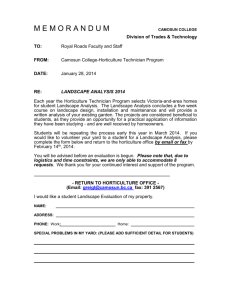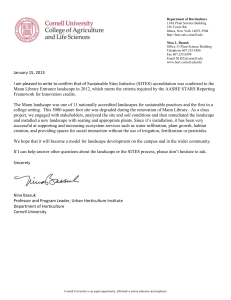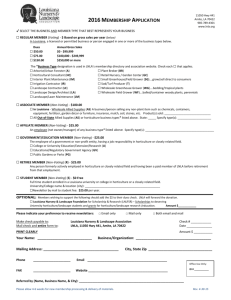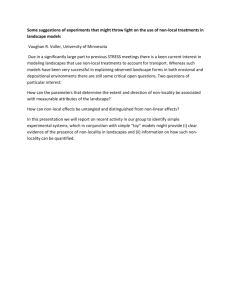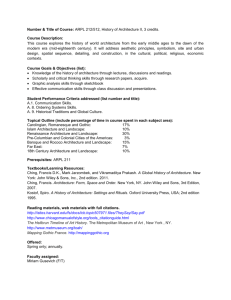Urban Landscape Ecology Specialist
advertisement
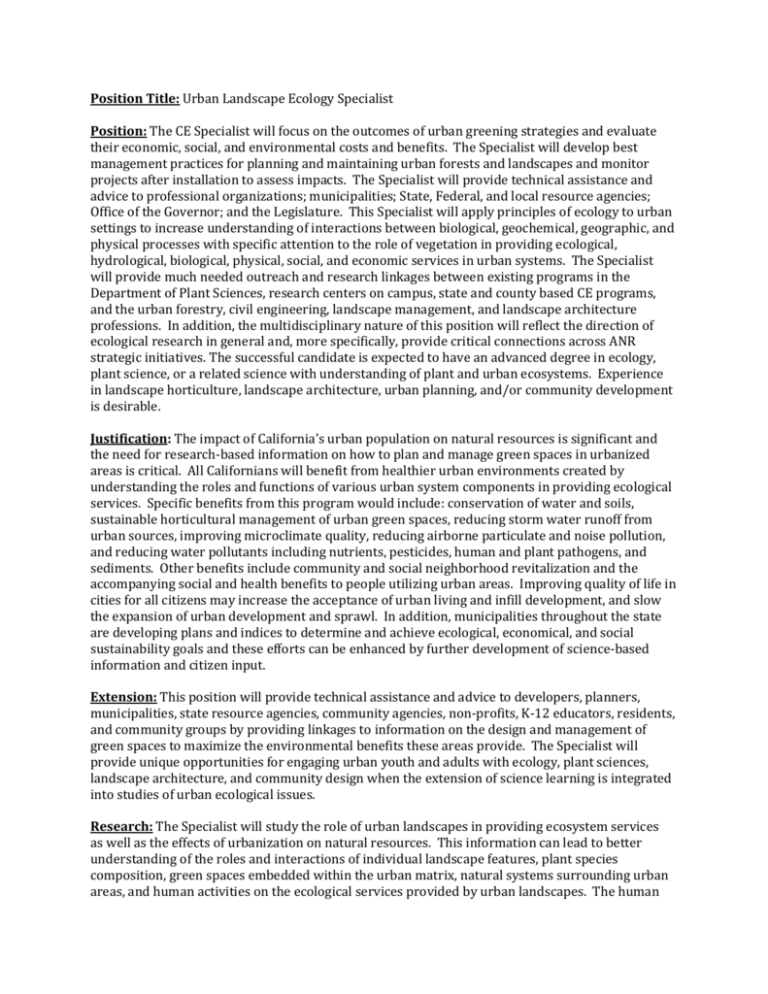
Position Title: Urban Landscape Ecology Specialist Position: The CE Specialist will focus on the outcomes of urban greening strategies and evaluate their economic, social, and environmental costs and benefits. The Specialist will develop best management practices for planning and maintaining urban forests and landscapes and monitor projects after installation to assess impacts. The Specialist will provide technical assistance and advice to professional organizations; municipalities; State, Federal, and local resource agencies; Office of the Governor; and the Legislature. This Specialist will apply principles of ecology to urban settings to increase understanding of interactions between biological, geochemical, geographic, and physical processes with specific attention to the role of vegetation in providing ecological, hydrological, biological, physical, social, and economic services in urban systems. The Specialist will provide much needed outreach and research linkages between existing programs in the Department of Plant Sciences, research centers on campus, state and county based CE programs, and the urban forestry, civil engineering, landscape management, and landscape architecture professions. In addition, the multidisciplinary nature of this position will reflect the direction of ecological research in general and, more specifically, provide critical connections across ANR strategic initiatives. The successful candidate is expected to have an advanced degree in ecology, plant science, or a related science with understanding of plant and urban ecosystems. Experience in landscape horticulture, landscape architecture, urban planning, and/or community development is desirable. Justification: The impact of California’s urban population on natural resources is significant and the need for research-based information on how to plan and manage green spaces in urbanized areas is critical. All Californians will benefit from healthier urban environments created by understanding the roles and functions of various urban system components in providing ecological services. Specific benefits from this program would include: conservation of water and soils, sustainable horticultural management of urban green spaces, reducing storm water runoff from urban sources, improving microclimate quality, reducing airborne particulate and noise pollution, and reducing water pollutants including nutrients, pesticides, human and plant pathogens, and sediments. Other benefits include community and social neighborhood revitalization and the accompanying social and health benefits to people utilizing urban areas. Improving quality of life in cities for all citizens may increase the acceptance of urban living and infill development, and slow the expansion of urban development and sprawl. In addition, municipalities throughout the state are developing plans and indices to determine and achieve ecological, economical, and social sustainability goals and these efforts can be enhanced by further development of science-based information and citizen input. Extension: This position will provide technical assistance and advice to developers, planners, municipalities, state resource agencies, community agencies, non-profits, K-12 educators, residents, and community groups by providing linkages to information on the design and management of green spaces to maximize the environmental benefits these areas provide. The Specialist will provide unique opportunities for engaging urban youth and adults with ecology, plant sciences, landscape architecture, and community design when the extension of science learning is integrated into studies of urban ecological issues. Research: The Specialist will study the role of urban landscapes in providing ecosystem services as well as the effects of urbanization on natural resources. This information can lead to better understanding of the roles and interactions of individual landscape features, plant species composition, green spaces embedded within the urban matrix, natural systems surrounding urban areas, and human activities on the ecological services provided by urban landscapes. The human activities influencing landscapes may include use, management, policy interventions, social structures, and governance. Better understanding of the structure and function of urban ecosystems can lead to better landscape and community designs and management practices that enhance and sustain ecosystem services. Examples include: studies of nitrogen cycling in urban settings, impact of urban gardening on health and well-being of participants, mitigation of pollutant laden runoff from urban areas, mitigating local effects of global climate change, development of integrated management systems for urban forests, urban exposure to wild fires, urban forest carbon offsets, and how plants enhance ecosystem functioning in urban settings. ANR Network: This Specialist will work with an existing cohort of UCCE specialists (e.g., Urban Landscape Horticulture Specialist), advisors, and faculty in ecology (e.g., UCD Plant Science Department Urban Ecology Professor and Wildlife Fish and UCD Conservation Biology Department Urban Ecology Professor), horticulture (e.g., UCD Plant Science Department Horticulture Professor), environmental science and policy, landscape architecture, civil and environmental engineering, planning, and human and community development. ANR groups with which this Specialist may engage include the Program Teams in Environmental Horticulture, Water Resources, and California Communities; the Garden-Based Learning, Science Education and Outreach, and Water Quality Workgroups; and the UC IPM, California 4-H Youth Development, and Master Gardener Programs. Network External to ANR: The Specialist will also form collaborations with the UCD Center for Regional Change and the California Center for Urban Horticulture. In addition, the Specialist will provide the linkage between researchers in affiliated fields of study and stakeholders which include policy makers, regulatory agencies, educators, and community groups. Support: The Department of Plant Sciences will provide travel funds, office and laboratory space, and complete human resource and business office. Internet, phone, desktop support, website, fileserver, cyber security, and email will be provided. Other support: Funding is available from well-established programs at the federal, state (e.g., Proposition 84 Urban Greening for Sustainable Communities Program, CALFire), and professional levels. The Million Trees Los Angeles program and the Sacramento Tree Foundation’s Greenprint Initiative in Northern California (5 million trees), Sacramento Utility District Shade Tree Program, Sacramento Urban Forest for Clean Air Project, are examples of urban greening programs Location: This position will be located on the UC Davis campus and will be placed in the Department of Plant Sciences with linkage to the Human Ecology Department. This linkage will facilitate collaborations with the programs in Environmental Horticulture, Landscape Architecture and Environmental Design, and Human and Community Development. Developed and Proposed by: This position proposal was developed by the UC Davis Department of Plant Sciences in consultation and collaboration with the UC Davis Department of Human Ecology Landscape Architecture Program and the UCANR Environmental Horticulture Program Team.
